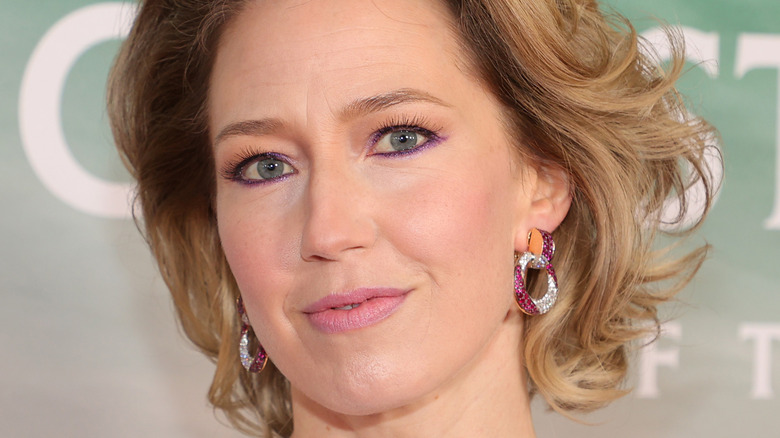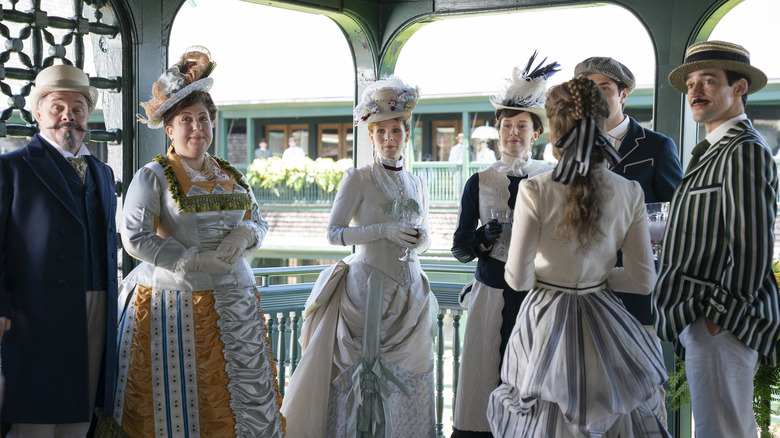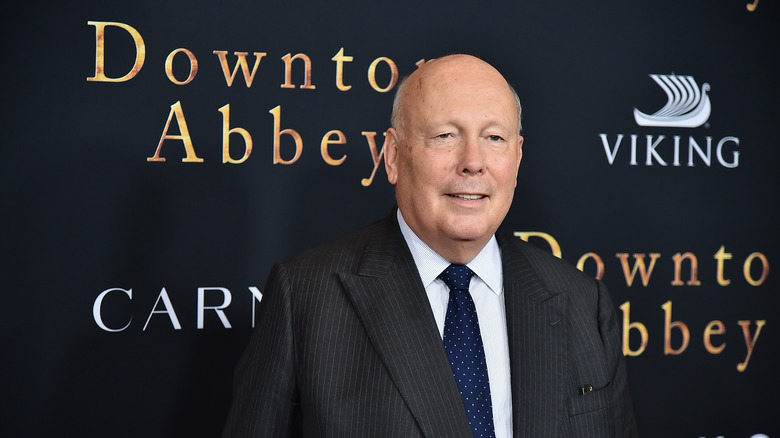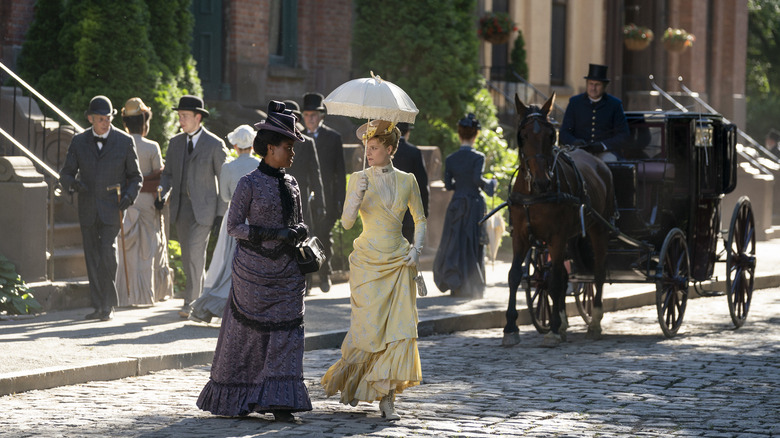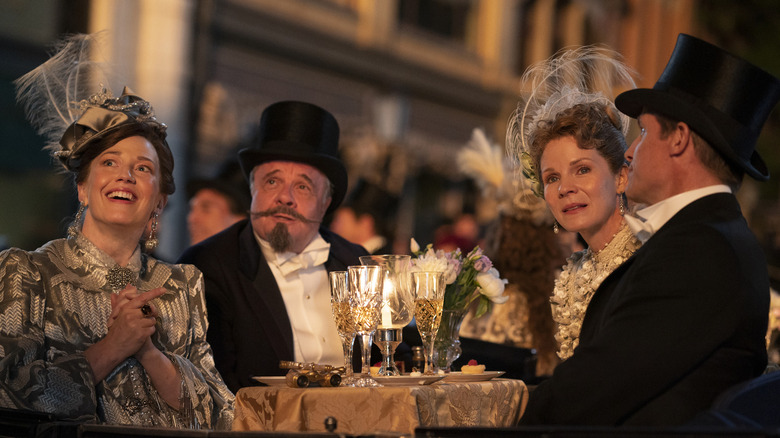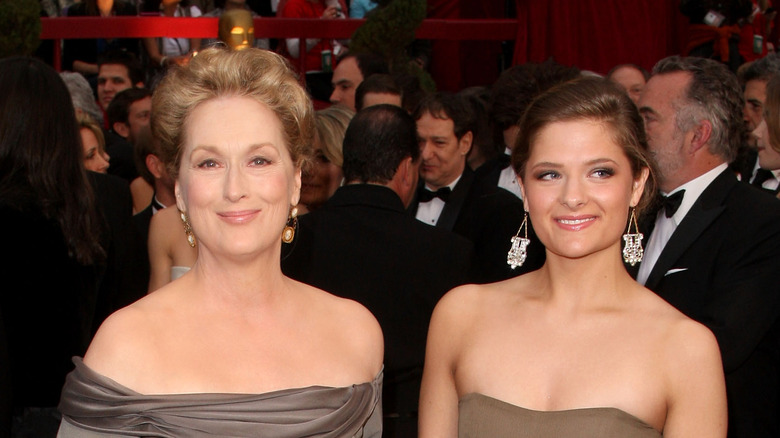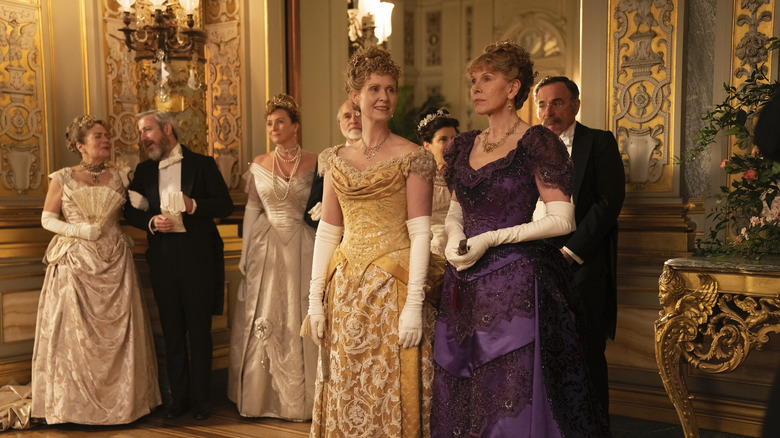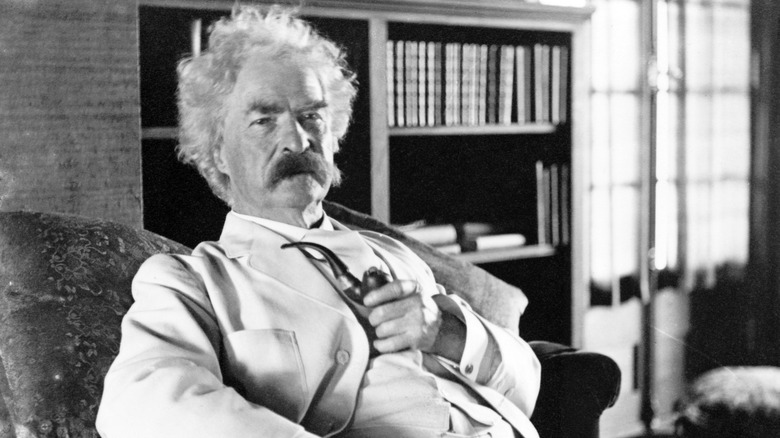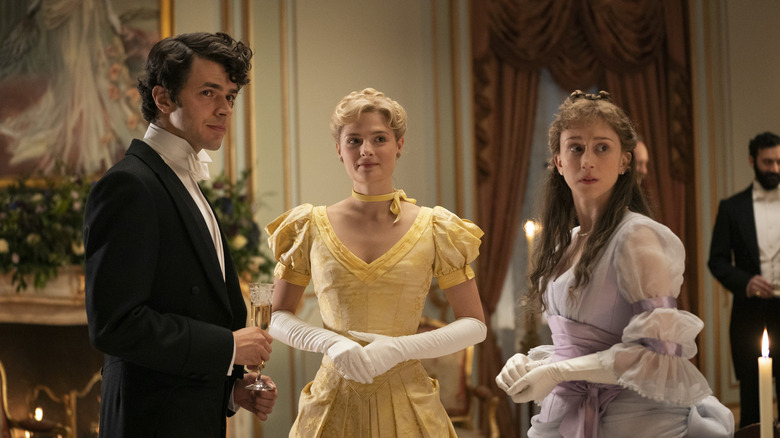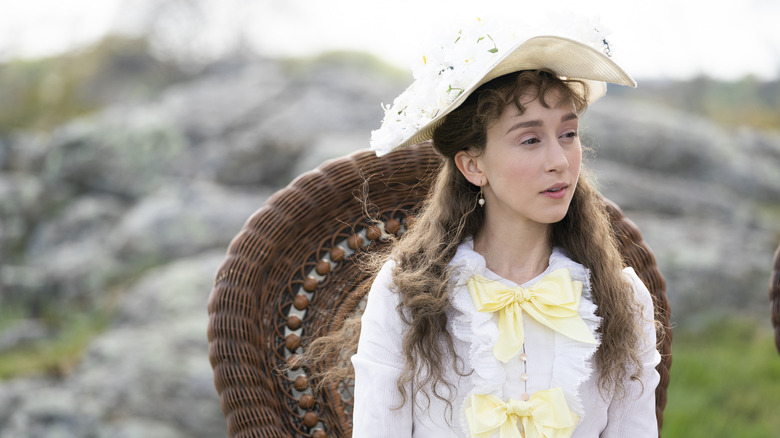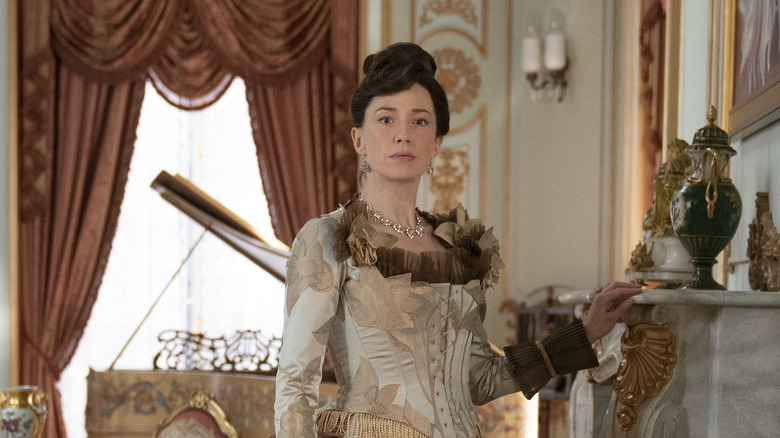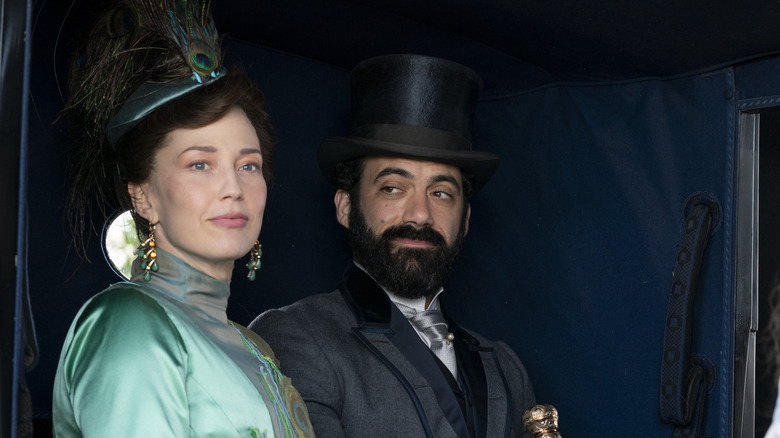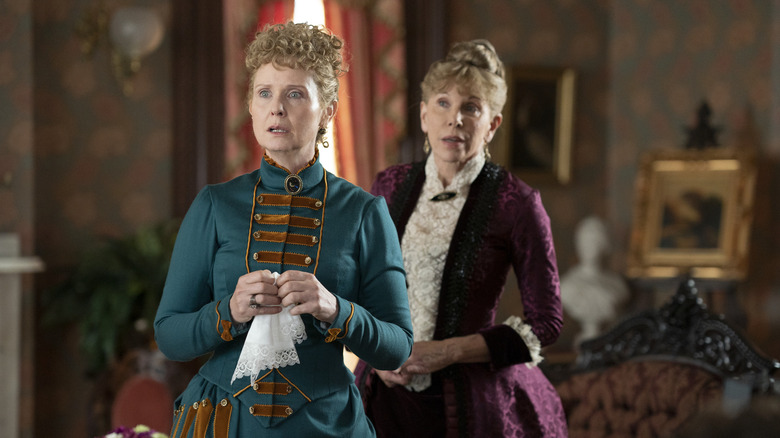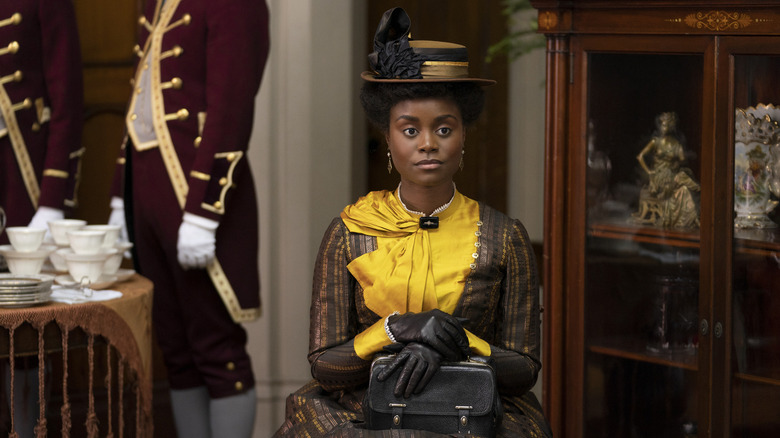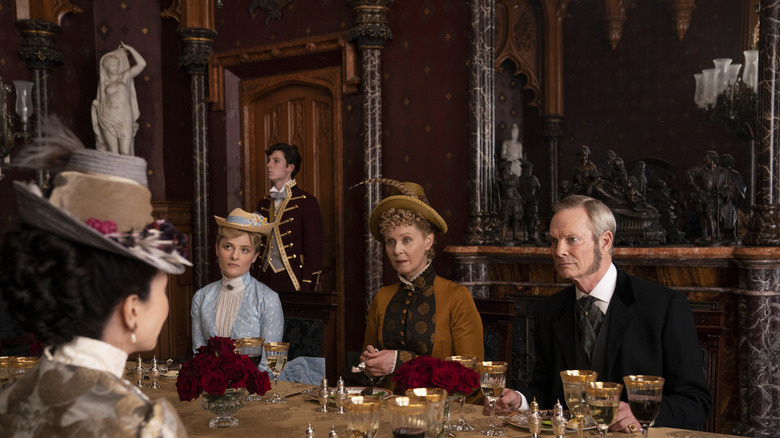The Untold Truth Of The Gilded Age
Television viewers have long embraced so-called costume dramas, watching actors recreate a bygone era while wearing spectacular outfits from that time.
One similarity shared by nearly all of the shows within that genre is that they hail from Britain. However, in February 2022, HBO introduced its own period drama boasting a distinctly American flair, "The Gilded Age." Set in New York City about a decade-and-a-half after the end of the Civil War, "The Gilded Age" delves into a particularly unique time in the city's history, when a number of ridiculously wealthy "robber barons" set down roots in Manhattan, building monuments to themselves while upsetting the established social order — and ultimately creating the city that exists today. Representing the old-money establishment are widow Agnes Van Rhijn (Christine Baranski, "The Good Fight") and her spinster sister Ada (Cynthia Nixon, "Sex and the City"), who are horrified when railroad magnate George Russell (Morgan Spector) and his socially climbing wife (Carrie Coon) move into the ostentatious palace they've constructed across the street.
The show has attracted a lot of attention since its premiere, yet there's much the casual viewer may not know about it. To find out more, keep reading to discover the untold truth of "The Gilded Age."
The Gilded Age comes from the creator of Downton Abbey
Viewers who stumbled upon "The Gilded Age" not knowing the show's provenance may have been struck by the similarities between the HBO series and "Downton Abbey," another lush period drama delving into the lives of wealthy aristocrats. Any resemblance in tone and subject matter shouldn't be surprising, given that both shows share the same creator: Julian Fellowes.
While Fellowes first set Downton in 1912, he went a few decades earlier for "The Gilded Age", which is set in New York City during the 1880s. Discussing the show with Entertainment Weekly, Fellowes explained why he felt that period of time was such a rich one to explore in a historical drama. "What happened after the Civil War was over was how these enormous fortunes grew out of it. You saw these enormous railway fortunes, shipping fortunes, copper, coal," Fellowes said, pointing to "fantastically rich" individuals who came to New York and ultimately built the city into what it would become.
These nouveau riche newcomers, added Fellowes, clashed with the staid old-money families who held sway. "So you had these great rivalries between the new families and the old," he said.
Series creator Julian Fellowes is a member of the House of Lords
Creating "Downton Abbey" and "The Gilded Age" are far from being Julian Fellowes' sole claims to fame. As IMDb illustrates, Fellowes has long history as a screenwriter in his native Britain, penning screenplays for the films "Gosford Park," "Vanity Fair," and "The Tourist," along with British TV miniseries "The Titanic," "The English Game," and "Belgravia."
While viewers are certainly familiar with Fellowes' film and television work, they might not realize he's also a member of the House of Lords, Britain's highest house of Parliament. A peerage in the House of Lords is typically granted due to heredity or appointment. Fellowes was appointed in 2010, reported The Guardian.
Fellowes' peerage in the House of Lords was not without controversy; in 2021, the Independent reported that he was one of 24 peers being investigated over allegations that they breached the House of Lords' stringent transparency regulations by not fully disclosing financial information about their respective companies. The investigation ultimately led to a change in rules, with financial declarations audited to ensure all information provided is complete and correct.
A Rutgers historian oversees the show's historical accuracy
When it comes to maintaining the accuracy of the time period, "The Gilded Age" has got it covered thanks to Dr. Erica Armstrong Dunbar, the Rutgers University historian who also serves as co-executive producer and historical consultant on the show. Speaking with Entertainment Weekly, Dunbar explained that even though "The Gilded Age" is fictional, "it's important to ground the storytelling in authenticity."
As Dunbar explained in an interview with Rutgers Today, the series' title — and the era it represents — holds a pretty significant truism about "The Gilded Age." "Don't forget, gilded isn't gold; it's gold-covered, superficial," she said. And while the central characters in the show hold immense wealth, the vast majority of Americans at the time did not; as Dunbar pointed out, "that inequity is something we are all wrestling with right now."
To recreate that bygone point in time, the production team on "The Gilded Age" pulled out all the stops to ensure that what viewers see onscreen is as historically sound as possible. "We want viewers to feel as though they are in the 1880s," Dunbar told Smithsonian Magazine.
The Gilded Age takes some artistic license with history
While "The Gilded Age" stirves for historical accuracy, it's also important to realize that the story being told is fictional, as are most of the key characters. That can become somewhat confusing when the show's fictional characters meet actual historical figures from the era, including American Red Cross founder Clara Barton, inventor Thomas Edison, and social arbiter Ward McAllister (Nathan Lane).
According to the show's historical consultant, Dr. Erica Armstrong Dunbar, that blend of fact and fiction doesn't hamper the show's quest to be as accurate as possible in other areas. "The clothing that our actors are wearing, the carriages that they're stepping into, the teacups that they are using, all of this is accurate," Dunbar said in an interview with Smithsonian Magazine.
However, as she told the New York Times, even if the names aren't real, the clash between old and new money that stands at the show's core certainly was. "It may seem like this is just a case of 'old' rich people and 'new' rich people fighting, and who cares," Dunbar said. "But it speaks to the changing of the guard, and the changing of traditions, and the way this nation has always grappled with change."
One of the series' stars is the daughter of a Hollywood legend
While "The Gilded Age" features such recognizable stars as Cynthia Nixon and Christine Baranski, there are also some newcomers. One of these is actor Louisa Jacobson, who plays Marian Brook, niece of the aforementioned actors' characters. According to Jacobson's IMDb credits, "The Gilded Age" is her second of just two screen credits, the other being a small role in a 2019 TV movie. (Her Broadway World bio also lists some theatrical credits).
While Jacobson may not be familiar to viewers, it's a certainty they know her mother: three-time Oscar winner Meryl Streep. As Jacobson told Vogue, she was starring in a production of Shakespeare's "Romeo and Juliet" in San Diego when she was approached about "The Gilded Age," and that she felt like she'd been "shot out of a cannon" during her first day on set.
Discussing her mom during on "Jimmy Kimmel Live!" Jacobson shared Streep's nickname for her — "Pickle" — along with an anecdote about her mother's annoying (but totally believable) habit. "This is a really embarrassing thing that she does," Jacobson said. "If she starts to speak to someone who has an accent, she'll just start doing the accent."
Reviews for the Gilded Age have been mixed
There's no denying that "The Gilded Age" has been a hit with viewers. As Deadline reported, a second season was quickly greenlit after the series' premiere proved to be the pay-cable channel's most-watched Monday night premiere in years.
However, reviews from television critics have been decidedly mixed. The Los Angeles Times, for example, criticized the show cramming in so many characters that "storylines are rendered in shorthand ... more as historical bullet points" than three-dimensional people. A review in the New York Times concurred, deriding "The Gilded Age" as "a pale echo" of "Downton Abbey," while Vulture described the show as being "as towering and empty as an untouched croquembouche, one meant only for display."
Not all reviews were so dismissive. CNN's Brian Lowry praised the show for casting "as impeccable as the period costumes," and lauded series creator Julian Fellowes for his mastery "at juggling a dizzying number of subplots." A Decider review described "The Gilded Age" as "'Downton Abbey' on steroids," and the show that "Downton" fans had "been waiting for." ABC News' Peter Travers conceded that while the show may be lacking "the upstairs/downstairs appeal" of "Downton Abbey," "it comes close enough to make the series must-see TV."
The show's title owes its origin to Mark Twain
"The Gilded Age" takes its title from a nickname for the era depicted in the show, nomenclature coined by one of America's most iconic authors. "It was originally Mark Twain who called this the gilded age," series creator Julian Fellowes explained in an interview with Entertainment Weekly. "The important word is gilded. It's not the golden age, it's the gilded age. And that tells us it was all about the surface. It was all about the look of things, making the right appearance, creating the right image. That's what was really what distinguished the era."
As the series' historical consultant Dr. Erica Armstrong Dunbar told EW, the era was also a time of immense societal change, "when the country was moving into the modern era."
Twain (whose real name was Samuel Clemens) famously used the term to title his 1873 novel "The Gilded Age: A Tale of Today," described by publisher Penguin Random House as "both a biting satire and a revealing portrait of post-Civil War America — an age of corruption when crooked land speculators, ruthless bankers, and dishonest politicians voraciously took advantage of the nation's peacetime optimism."
The Gilded Age had a decade-long journey from NBC to HBO
While "The Gilded Age" just made its HBO debut in January 2022, the show had actually been in the works for more than a decade beforehand. It was back in 2012, in fact, when TVLine first reported that NBC had inked a deal with "Downton Abbey" creator Julian Fellowes to produce the series for the network. As The Hollywood Reporter pointed out in 2019, the show had even been officially picked up by NBC in 2018; the network dropped those plans when then-NBC president Robert Greenblatt exited and headed to WarnerMedia (corporate owner of HBO).
According to Fellowes, the decade-long delay between the announcement and its eventual TV debut was simply that "Downton Abbey" hadn't stopped being successful, demanding Fellowes' primary attention.
As for the move from NBC to HBO, Pearlena Igbokwe, chair of Universal Studio Group, told the New York Times that "the scope and ambition for the project was pretty epic," beyond the budgets of network television. "It was fantastic, but it was a decidedly big show," she said, admitting NBC didn't want to "restrict Julian's vision in any kind of way, and we don't know if we have the appetite for that vision."
Taissa Farmiga initially auditioned for a different role in The Gilded Age
Among the familiar faces appearing in "The Gilded Age" is Taissa Farmiga, who plays the naive Gladys Russell, daughter of wealthy railway magnate George Russell (Morgan Spector) and socially ambitious wife Bertha (Carrie Coons). According to IMDb, Farmiga's extensive credits include such films as Clint Eastwood's "The Mule," while her TV work includes playing three distinct characters in four different seasons of "American Horror Story."
Speaking with The Hollywood Reporter, Farmiga revealed she initially auditioned to play Marian, now played by Louisa Jacobson. When recording her audition, Farmiga "didn't really feel like I clicked with the character," and "didn't feel great about" what she'd put on tape. The casting team ultimately felt the same way, telling Farmiga she didn't seem right for the role. At the same time, however, they asked her to read for Gladys, an opportunity she jumped at.
"And immediately, I saw a lot of my young teenage self in Gladys and that desire to break free and find independence and experience the world through your own eyes, as opposed to the eyes of your family," she explained of the connection she forged with the character.
Carrie Coon's character was originally cast with another actor
Many viewers of "The Gilded Age" no doubt recognized Carrie Coon from her previous roles in such TV series as "Fargo," and "The Leftovers." Though she now plays Bertha Russell, Coon wasn't the original actor to be cast as the relentlessly aspiring Manhattan socialite.
As The Hollywood Reporter recalled, Amanda Peet had previously been cast as Bertha Russell. Peet, in fact, was onboard when the show was gearing up to go into production in March of 2020 — plans that immediately cratered when the pandemic slammed the brakes on all film and television production. When production eventually restarted in September of that same year, Peet was no longer available due to a scheduling conflict, leading Coon to be cast in her stead.
Speaking with The AV Club, Coon explained how she connected to Bertha. "So she has a chip on her shoulder as it relates to these older families who were born into their wealth, and that's something I relate to," said Coon. "I come from modest circumstances and I've kind of made my way. I know that meritocracy in this country is a myth, that the cards are not stacked the same for everyone."
The Russells are fictional, but based on specific historical figures
Arguably the most intriguing characters in "The Gilded Age" are George and Bertha Russell (played by Morgan Spector and Carrie Coon), whose immense wealth comes from his ownership of a railroad. While the characters themselves are fictional, they are based on some real-life historical figures of that era.
In fact, Spector explained that his character is inspired by Jay Gould, the real-life railroad magnate often described as one of the "robber barons" who held the bulk of America's wealth during the period depicted in "The Gilded Age." "He is a 19th century industrialist, a robber baron," Spector said of Gould in a promotional video posted on Instagram. "Gould was really vilified in the papers at the time. He was someone who became a kind of living embodiment of all of the inequalities of the era."
Describing his character, Spector referenced the similarity to Gould as commanding "such insane levels of power" that he can target people and then "crushes them like ants ... There's an aspect of George where he gives his own fury free rein sometimes [that is] almost inhuman."
The show was hit with charges of unfair labor practices
Before "The Gilded Age" made its HBO debut, the series made unfortunate headlines due to a behind-the-scenes skirmish with one of the labor unions involved in America's film and television industry. While the show was in production during May 2021, reported Deadline, the series was hit with a complaint of unfair labor practices from the American Federation of Musicians.
The union laid out its grievance in a statement, claiming that 23 orchestra musicians working on the show portraying musicians — not actually playing instruments, but miming that they were playing — were terminated after asking that they be represented by the AFM and paid union-scale wages. AFM president Ray Hair also issued a statement, insisting that producers of "The Gilded Age" were "violating workers' rights" by preventing them from being repped by their union, regardless of whether they made music or just pretended to. One of the fired musicians, Theo Zimmerman, complained that the whole experience "leaves a very bad taste in the mouth."
Days later, Deadline reported the dispute had been settled, with a rep for HBO confirming the production had reached a an agreement with the union "to cover their members on an AFM basis."
Denée Benton was invited to help shape her character
Interviewed by Smithsonian Magazine, "The Gilded Age" historical consultant Dr. Erica Armstrong Dunbar expressed how important it was that the show depict the experiences of African Americans during that era, "people who were one, maybe two generations removed from slavery." Series creator Julian Fellowes concurred, telling USA Today that "dealing with America 14 years after the end of slavery, not to have a Black storyline would be ridiculous, really."
As a result, that experience is seen by viewers through the eyes of Peggy Scott (Denée Benton), an aspiring journalist hired as personal secretary to Christine Baranski's Agnes Van Rhijn.
As Benton recalled for USA Today, while auditioning she was asked "off the record" how she, as a Black woman, responded to the script. This, she explained, opened the door to bring her personal experience as a Black woman to help shape the character and her storyline. "I really got the opportunity to be honest about some of the things I was excited about, and some things I thought were potentially out of touch or not as authentic as they could have been," Benton said, admitting she "felt like a fierce protector of Peggy."
The Gilded Age is rife with Broadway stars
With production of "The Gilded Age" based in New York City (with location filming in Newport, Rhode Island, and Troy, New York), it shouldn't be surprising that the series availed itself of the vast supply of Broadway actors in the Big Apple.
As TV Insider, pointed out, some of these actors are known for both stage and screen work, including stars Christine Baranski, Cynthia Nixon, and Audra McDonald, a six-time Tony winner and all-around Broadway legend who's also known for her roles in TV series including "Private Practice," and "The Good Fight" (in which she appeared opposite Baranski). Nathan Lane (who plays Ward McAllister) has likewise spread his time between Hollywood and Broadway, racking up six Tony nominations (and three wins) while also establishing himself onscreen, particularly opposite Robin Williams in "The Birdcage."
In addition, "The Gilded Age" is also jam-packed with actors who are primarily known for their Broadway work, including Bill Irwin (who plays the would-be suitor of Nixon's character), Donna Murphy (Mrs. Astor), Denée Benton (Peggy Scott), John Douglas Thompson (Arthur Scott), Simon Jones (who plays haughty butler Bannister), Douglas Sills (faux French chef Monsieur Baudin), and several other members of the cast.
